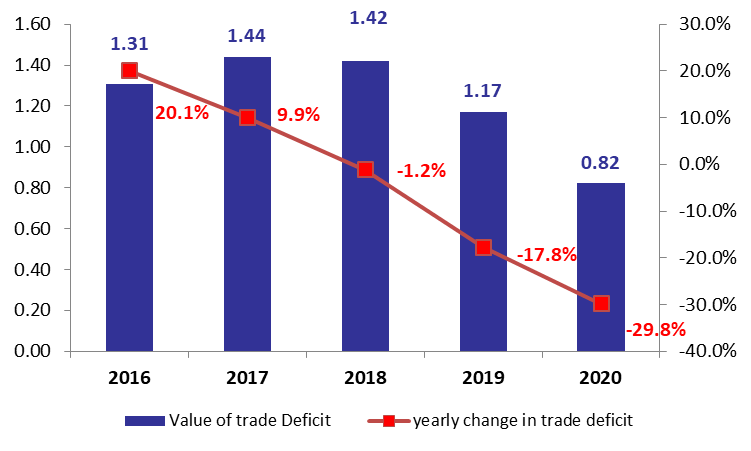During the first month of 2020, Lebanon’s trade deficit totaled $820.5M, narrowing from the $1.17B registered in the same month last year. In fact, total imported goods retreated by 18% year-on-year (YOY) to $1.2B. This may be attributed to the national foreign currency shortage, as the country grapples with an ongoing economic and financial crisis while the BDL covers the imports of essential goods. Meanwhile, Lebanon’s total exports added 41.3% YOY to $333.1M in January 2020.
In detail, the “Mineral products” grasped the lion’s share of total imported goods with a stake of 39.7%. “Products of the chemical or allied industries” ranked second, composing 10.9% of the total while “Vegetable Products” and “Prepared foodstuffs, beverages & tobacco” grasped the respective shares of 6.6% and 6.2%, respectively.
Compared to January 2019, the value of imported “Mineral products” climbed from $263.9M to $458.1M. Even though the imported volume of mineral products (mostly oil) only increased by an incremental 0.02%YOY, the price of international oil over the period grew by 5.7%YOY to $63.7/barrel. In turn, the values of “Products of the chemical or allied industries”, “Vegetable Products” and “Prepared foodstuffs, beverages & tobacco” recorded the yearly downticks of 25.3%, 22.5% and 34.6% to settle at $126.4M, $75.7M and $72M, respectively.
In January, the top three import destinations were Greece, Italy and Turkey grasping the respective shares of 9.7%, 9.1% and 8.9% of the total value of imports. It’s worthy to note that China was historically a top importer, but the emergence of the first coronavirus case in China in December 2019 quickly evolved to become a global outbreak. As such, the share of Lebanese imports from China significantly dropped from last year’s 10.9% to 5.7% in January 2020.
On the Exports front, Lebanon’s top exported products were “Pearls, precious stones and metals” grasping a share of 47.8% of the total. “Base metals &articles of base metal” and “Prepared foodstuffs, beverages & tobacco” followed, with each grasping a share of 8.96% and 8.90%, respectively, of the total.
In detail, the value of “Pearls, precious stones and metals” climbed to $159.1M in January 2020, compared to $78.6M in January 2019. By the same token, the value of “Base metals &articles of base metal” and “Prepared foodstuffs, beverages & tobacco” added an annual 58.7% and 9.2% to $29.8M and $29.7M, respectively.
The top three export destinations in January 2020 were Switzerland, UAE and KSA with the respective shares of 39.1%, 11.8% and 6.7%.
Trade Deficit in January ($B)

Source: Lebanese Customs
Source: Lebanese Customs